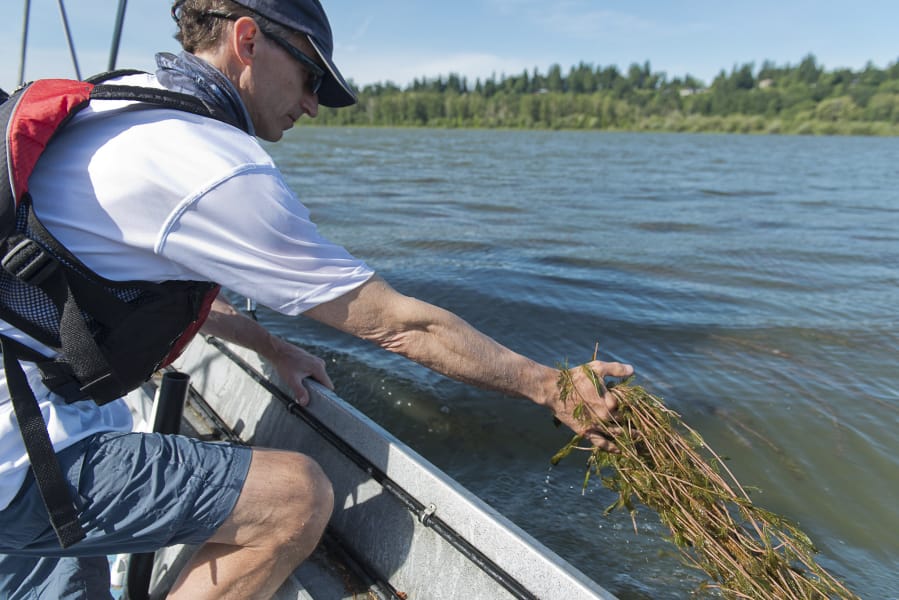The state has given Friends of Vancouver Lake the OK to use its preferred herbicide to treat milfoil infestation, the group announced Sunday.
The announcement came during a fundraiser at the Vancouver Lake Sailing Club, part of the Friends’s ongoing efforts to eradicate the aquatic invasive weed. After surveying the lake for two days in early July, ProcellaCOR — favored over other herbicides because it will prevent an extended closure of the lake — will be placed in the lake July 16, said Larry Cassidy, the group’s chairman.
“We’re going to be able to use the best herbicide,” Cassidy said. “This is a big deal for Vancouver. This is a big deal for Clark County. We need to work not just this year but for the next few years.”
Eurasian milfoil started choking the shallow lake a couple of years ago. The cause is unknown, though some have surmised that it may have been introduced by a boat or through a flushing channel connected to the Columbia River.
“I had a pit in my stomach because I knew what that meant,” said Philip Parshley, the sailing club’s commodore, about the first time he noticed the weeds.
Milfoil currently covers 20 percent of the lake, primarily located near shorelines, and could engulf it by 2022 if not treated, according to the Friends group. The tangles of vegetation would render the lake unusable for rowing, sailing and other recreation. It also warms the water, chokes fish habitat, drives out native plant species and makes swimming dangerous.
The Friends fear a milfoil takeover would turn the lake into a mosquito-infested swamp. Losing it could lead to an economic hit to the area due to the loss of sailing, rowing and other events.
It would also represent a loss for those wishing to enjoy natural features, including views of Mt. Hood and bald eagles, said Keith Collins, a member of the Vancouver Lake Rowing Club. “It’s just a wonderful way to spend an afternoon.”
The U.S. Environmental Protection Agency approved the use of ProcellaCOR in February 2018. It dissipates quickly, allowing the lake to reopen within 24 to 48 hours after application, Ted Gathe, a member of the Friends group and former Vancouver city attorney, told the Port of Vancouver commission in May.
After approving a permit in May to control milfoil at the lake, the state Department of Ecology recently approved the use of ProcellaCOR in 500 acres of water, Cassidy said.
The Friends group intends to hire AquaTechnex — a company that helps ecologically manage lakes — to treat the milfoil. The group raised $170,000 prior to the Sunday event, where it collected an additional $15,000 to $20,000, Cassidy estimated.
Exactly how much ProcellaCOR will need to be applied this year will be determined at the survey in early July. Cassidy said he hopes to raise $300,000 for the ongoing efforts.
The July date also can’t come quickly enough for Parshley, who struggled at times gliding near shorelines Sunday as milfoil became stuck to the motor of a flat bottom fishing boat.
“You can see the forest over here now,” Parshley said, gazing at the weeds between the boat and Turtle Island in the north part of the lake. “It’s just crazy.”




